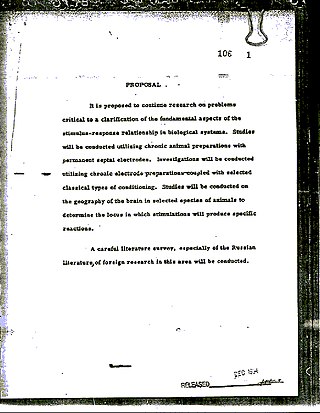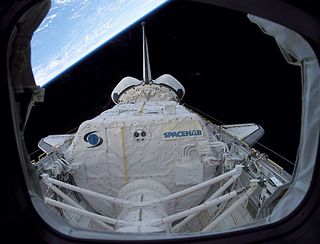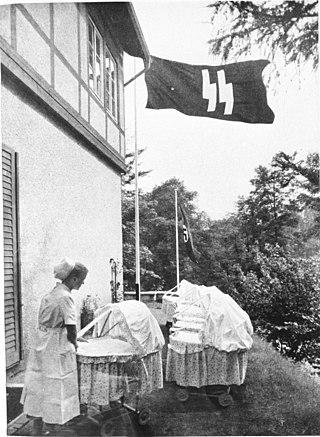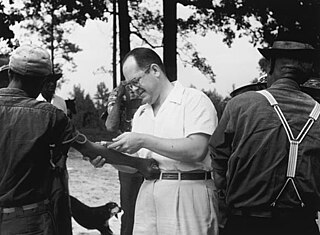
Project MKUltra was an illegal human experimentation program designed and undertaken by the U.S. Central Intelligence Agency (CIA) and intended to develop procedures and identify drugs that could be used during interrogations to weaken people and force confessions through brainwashing and psychological torture. It began in 1953 and was halted in 1973. MKUltra used numerous methods to manipulate its subjects' mental states and brain functions, such as the covert administration of high doses of psychoactive drugs and other chemicals without the subjects' consent, electroshocks, hypnosis, sensory deprivation, isolation, verbal and sexual abuse, and other forms of torture.
The British Academy of Film and Television Arts is an independent trade association and charity that supports, develops, and promotes the arts of film, television and video games in the United Kingdom. In addition to its annual award ceremonies, BAFTA has an international programme of learning events and initiatives offering access to talent through workshops, masterclasses, scholarships, lectures, and mentoring schemes in the United Kingdom and the United States.

STS-107 was the 113th flight of the Space Shuttle program, and the 28th and final flight of Space Shuttle Columbia. The mission ended, on February 1, 2003, with the Space Shuttle Columbia disaster which killed all seven crew members and destroyed the space shuttle. It was the 88th post-Challenger disaster mission.

Lebensborn e.V. was an SS-initiated, state-supported, registered association in Nazi Germany with the stated goal of increasing the number of children born who met the Nazi standards of "racially pure" and "healthy" Aryans, based on Nazi eugenics. Lebensborn was established by Heinrich Himmler, and provided welfare to its mostly unmarried mothers, encouraged anonymous births by unmarried women at their maternity homes, and mediated adoption of children by likewise "racially pure" and "healthy" parents, particularly SS members and their families. The Cross of Honour of the German Mother was given to the women who bore the most Aryan children. Abortion was legalised by the Nazis for disabled and non-Germanic children, but strictly punished otherwise.

CBeebies is a British free-to-air public broadcast children's television channel owned and operated by the BBC. It is also the brand used for all BBC content for children aged 6 years and under. Its sister channel, CBBC, is aimed at older children aged 6 to 12. It broadcasts every day from 6:00 am to 7:00 pm, timesharing with BBC Four.
Anne Wood, CBE is an English children's television producer, responsible for creating shows such as Teletubbies with Andrew Davenport. She is also the creator of Tots TV and Rosie and Jim. She was a recipient of the Eleanor Farjeon Award.
The BAFTA TV Awards, or British Academy Television Awards, are presented in an annual award show hosted by the BAFTA. They have been awarded annually since 1955.
Roger Arthur Graef OBE was an American-born British documentary filmmaker and theatre director. Born in New York City, he moved to Britain in 1962, where he began a career producing documentary films investigating previously closed institutions, including Government ministries and court buildings.
Steven Ryde is an English actor, voice-over artist and producer, best known for his role as Tatty Bogle from 1994 to 1998 in the children's TV series Wizadora. He has worked mainly in children's television for over 30 years.

BAFTA Cymru is the Welsh branch of the British Academy of Film and Television Arts (BAFTA) and was founded in 1987.
Arthur Ibbetson BSC was a British cinematographer.

The Sustained Spheromak Physics Experiment (SSPX) is a program at Lawrence Livermore National Laboratory in the United States established to investigate spheromak plasma.

Dispatches is a British current affairs documentary programme on Channel 4, first broadcast on 30 October 1987. The programme covers issues about British society, politics, health, religion, international current affairs and the environment, and often features a mole inside organisations under journalistic investigation.

Nina and the Neurons is a British television programme shown on the CBeebies channel, aimed at young children to help them understand basic science. Nina is a neuroscientist who enlists the help of five Neurons in her brain to answer a scientific question.

Stephen Lambert is an English television producer and executive who works in Britain and America. He is the chief executive of Studio Lambert, one of All3Media's production companies, which produces Undercover Boss, Gogglebox, Naked Attraction, Squid Game: The Challenge, Race Across the World and The Traitors.
Blood, Sweat and T-shirts is a British TV documentary series, broadcast in 2008 on BBC Three.

Numerous experiments which are performed on human test subjects in the United States are considered unethical, because they are performed without the knowledge or informed consent of the test subjects. Such tests have been performed throughout American history, but some of them are ongoing. The experiments include the exposure of humans to many chemical and biological weapons, human radiation experiments, injections of toxic and radioactive chemicals, surgical experiments, interrogation and torture experiments, tests which involve mind-altering substances, and a wide variety of other experiments. Many of these tests are performed on children, the sick, and mentally disabled individuals, often under the guise of "medical treatment". In many of the studies, a large portion of the subjects were poor, racial minorities, or prisoners.

A social experiment is a method of psychological or sociological research that observes people's reactions to certain situations or events. The experiment depends on a particular social approach where the main source of information is the participants' point of view and knowledge. To carry out a social experiment, specialists usually split participants into two groups — active participants and respondents. Throughout the experiment, specialists monitor participants to identify the effects and differences resulting from the experiment. A conclusion is then created based on the results. Intentional communities are generally considered social experiments.

The Simons Foundation Autism Research Initiative, or SFARI for short, is a research program established in 2005 by the Simons Foundation, which focuses on all aspects of autism research. Its director is Kelsey Martin. The organization has funded more than $200 million in autism research to 150 different investigators since 2007. The awards they give out include Bridge to Independence Awards, Pilot Awards, Research Awards, and Explorer Awards. One specific type of research they specialize in is mouse models of autism, which they are trying to make more available in cooperation with the Jackson Laboratory.

The ISEE-2 was an Explorer-class daughter spacecraft, International Sun-Earth Explorer-2, was part of the mother/daughter/heliocentric mission. ISEE-2 was a 165.78 kg (365.5 lb) space probe used to study magnetic fields near the Earth. ISEE-2 was a spin-stabilized spacecraft and based on the design of the prior IMP series of spacecraft. ISEE-1 and ISEE-2 were launched on 22 October 1977, and they re-entered on 26 September 1987.












